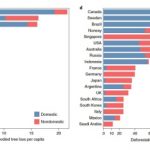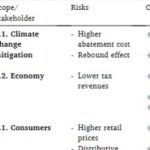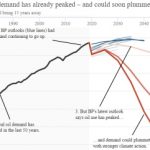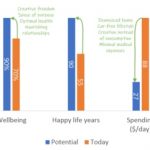On January 1st France launched its flagship EV “social leasing” programme, at a typical price of €100/month, targeting 25,000 users. Within six weeks it was oversubscribed, forcing the government to close the scheme and alter the subsidy regime to accommodate the new total of 50,000. The programme’s popularity demonstrates its relevance and justifies its future expansion. However, the system needs to change if it is to meet the challenges … [Read more...]
Cutting energy usage with Behaviour Change: Covid and Russia’s war show it can happen fast
Technology alone won’t meet our net zero targets. For the foreseeable future there will always be carbon-intensive assets and hard-to-abate sectors. Only “behaviour change” by citizens worldwide can bridge the gap that technology cannot. And the reduced energy use that it delivers will also lower the targets that the rapid growth of clean energy supply are now chasing. Here the IEA lays out the challenges in its Behavioural Changes tracking … [Read more...]
Open-source modelling for the energy transition and climate change
Modelling tools are becoming increasingly important to policy makers for creating transition pathways. More detail is required as the pace of change accelerates. Yet complexity is increasing as new technologies and solutions come online. And those models are needed at the local level, not just the national and global. It’s why the EU is funding, through Horizon 2020, a range of projects to not only make those tools a success, but make them freely … [Read more...]
The 10 big problems with simply replacing fossil cars with electric
The planned rapid transition to electric vehicles has major challenges. Schalk Cloete compiles them into a list of ten, including: preserving our car-centric cities preserves its inefficiencies and societal costs; it works against much of the personal “behaviour change” we need; though BEVs (battery electric vehicles) are better in cities, when infrastructure costs are included they are less efficient than hybrids and modern ICEs for many driving … [Read more...]
Behaviour Change: strategies and case studies for reaching net-zero by 2050
Technological solutions on their own are unlikely to deliver emissions reductions at the speed and scale required to reach net zero by 2050. Daniel Crow, Insa Handschuch, Gabriel Saive and Leonie Staas at the IEA look at a suite of policy-driven citizen “behaviour changes” that should be used to bridge the gap. The impact will be greatest in advanced economies where energy intensity is highest. Meanwhile, in emerging economies the good habits put … [Read more...]
Electric Micromobility: how to cut emissions, create jobs and transform urban transport
What if e-bikes, electric scooters and electric skateboards were added to walking and cycling in our attempts to reduce emissions through behaviour change? It’s a promising solution for all those people who genuinely want to reduce their emissions but don’t want the extra exercise. Quoting from their report, Jennifer Dungs at EIT InnoEnergy looks at the gains to be made, along with a valuable reduction in city congestion. Micromobility is still … [Read more...]
Norway an EV role model? Their pathway is expensive and paid for with oil & gas exports
Norway is an EV leader thanks to a generous pot of tax incentives. Today, battery-electric cars make up more than half of all new car sales in Norway. Schalk Cloete takes a detailed look at what those incentives cost, and how many tonnes of CO2 they avoid. In short, Norway – a major oil and gas exporter - needs to sell over 100 barrels of oil (which emits 40 tonnes of CO2) to pay for the tax breaks it gives EVs to avoid one tonne of CO2. And … [Read more...]
What is your nation’s “deforestation footprint”? When imports cut down trees somewhere else
Behaviour change is now inextricably linked to the transition and must be part of the world’s emissions reduction strategy, and there are many different types of relevant behaviour and ways to measure the impacts. One is to look at deforestation, caused by chopping down trees to meet our consumer needs. To grasp whose behaviour has to change we need to appreciate to what extent deforestation in places like Brazil, Canada, Liberia, Vietnam etc., … [Read more...]
Rooftop Solar: economies of scale can challenge the centralised grid
One of our recent articles explained how rooftop solar PV is more expensive that a centralised supply, and that the transmission and distribution cost savings of the rooftop system, on their own, do not make up for this cost difference. Here, Javier López Prol at the Wegener Center for Climate and Global Change, University of Graz, responds to those challenges. First, the economies of scale of distributed rooftop solar are yet to be realised. … [Read more...]
BP Outlook 2020: “peak oil” has already happened
BP’s latest Outlook predicts – for the first time - that oil saw its peak in 2019. In each of BP’s Outlooks, published annually since 2011, they have revised their predictions for the global energy landscape to 2050 as new data comes in. The growth of clean energy and the changing shape of climate policies have seen each successive forecast increase the share of renewables at the expense of fossil fuels. This year even gas has seen its prospects … [Read more...]
We need Behaviour Change and “Life Efficiency”, because efficiency gains and clean energy will never be enough
Behaviour change – reducing emissions by changing how we live our lives - should be part of every government and think tank’s sustainable scenario, explains Schalk Cloete. That’s because impressive advances in energy efficiency and clean energy won’t be enough to contain the emissions of a world continuing with the essential task of lifting billions of people out of poverty. But this should not be seen as a problem, says Cloete, because behaviour … [Read more...]
Decarbonising light duty vehicles globally: consumer choice, technology, policy pathways
The MIT Energy Initiative (MITIE) has completed a 3-year study of “Mobility of the Future” to plot a decarbonised pathway for light duty vehicles (i.e. cars) globally. Wide in scope and detail, it covers government policies, consumer choices and technologies, combining their multiple and complex impacts to make their assessments. Kathryn Luu at MITIE reviews the final 220-page report. For consumers, cost, convenience, and — increasingly — carbon … [Read more...]
Behaviour Change: measuring complex mobility options to make cities smarter
How do you factor future behaviour change into transport, housing, workplace and energy infrastructure planning? Clearly, future plans based on past behaviour will end up being wrong. And metrics that tell us which behaviour is most efficient can point us in better directions. We won’t find the answer until we start measuring it. That’s why the National Renewable Energy Laboratory (NREL) is leading a collaboration of U.S. government and academia … [Read more...]














